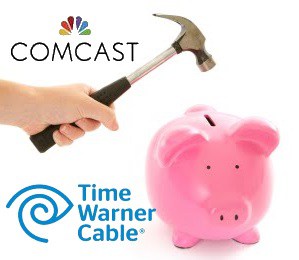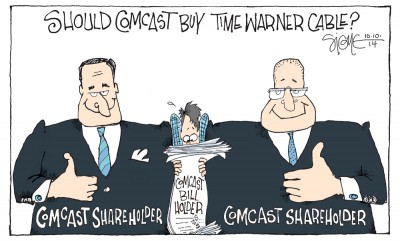
With regulators considering rejecting Comcast’s $45 billion merger with Time Warner Cable, investment bankers hoping to reap fat fees “advising” Comcast and Time Warner Cable about the deal are starting to panic they won’t get paid.
Although a merger flop won’t hurt giants like JPMorgan Chase, which operates a 24/7 cash vacuum, continuously sucking fees from companies engaged in Mergermania, smaller “boutique” investment banks like Allen & Co., Centerview Partners, and PJT Partners don’t have that luxury.
Reuters reports some of the smaller investment banks involved in the deal are now on edge, worried they won’t get their share of at least $140 million in investment banking advisory fees that would be paid to complete the Comcast-Time Warner Cable merger deal.
“Big banks have many deals going on, and they can afford to lose one more, even though it is painful. Smaller firms are less diversified, so for them it’s much more painful,” Campbell Harvey, a professor of international business at Duke University’s Fuqua School of Business, told Reuters.
But crying towels are also being readied for investment bankers involved in two side deals involving Charter Communications, which are likely to also fall apart in a chain reaction if the Comcast-Time Warner Cable merger dies.
 Charter has deals pending with both Comcast and Time Warner Cable to launch GreatLand Connections and have plans to takeover Bright House Networks, both contingent on the Comcast-Time Warner Cable merger getting approval.
Charter has deals pending with both Comcast and Time Warner Cable to launch GreatLand Connections and have plans to takeover Bright House Networks, both contingent on the Comcast-Time Warner Cable merger getting approval.
Those two transactions will bring another $170 million in fees to investment bankers, with JPMorgan Chane, former top Morgan Stanley banker Taubman, and Barclays Bank splitting $51-68 million in fees between the three firms.
Time Warner Cable’s own advisers are waiting for $57-75 million in fees as well, among them Morgan Stanley, Allen & Co., Citigroup, and Centerview Partners.
To understand how important the fees are to smaller bankers, Taubman was ranked 23rd in mergers & acquisitions fees in 2014. Without the Comcast deal, Taubman drops out of the top-100.
Some bankers may have negotiated a token fee to be paid by Comcast and Time Warner Cable if the deal falls apart. Most estimates suggest usual fees amount to around 10-15 percent of the amount they would collect if a merger is successfully completed.


 Subscribe
Subscribe
 Charter Communications today officially announced it will acquire control of Bright House Networks in a $10.4 billion deal the two companies are calling a “partnership.”
Charter Communications today officially announced it will acquire control of Bright House Networks in a $10.4 billion deal the two companies are calling a “partnership.” The deal is partly contingent on Time Warner Cable, which has a right to acquire Bright House for itself as part of a long-standing partnership between the two cable companies on programming and technology matters. But such an acquisition now seems remote, considering Time Warner Cable remains tied up in its year-long effort to be acquired by Comcast. An even larger Time Warner Cable would further complicate that transaction in Washington, where regulators are clearly concerned about supersizing Comcast. Since some regulators count Bright House customers as de facto Time Warner Cable customers, having Bright House acquired by Charter would seem to reduce Comcast’s influence over American broadband and cable television by cutting its combined market share from 29 to 27 million subscribers.
The deal is partly contingent on Time Warner Cable, which has a right to acquire Bright House for itself as part of a long-standing partnership between the two cable companies on programming and technology matters. But such an acquisition now seems remote, considering Time Warner Cable remains tied up in its year-long effort to be acquired by Comcast. An even larger Time Warner Cable would further complicate that transaction in Washington, where regulators are clearly concerned about supersizing Comcast. Since some regulators count Bright House customers as de facto Time Warner Cable customers, having Bright House acquired by Charter would seem to reduce Comcast’s influence over American broadband and cable television by cutting its combined market share from 29 to 27 million subscribers.
 Californians get a reprieve from the menacing Comcast-Time Warner Cable merger with an announcement from the California Public Utilities Commission it is putting further consideration of the merger deal on hold until later this spring.
Californians get a reprieve from the menacing Comcast-Time Warner Cable merger with an announcement from the California Public Utilities Commission it is putting further consideration of the merger deal on hold until later this spring.